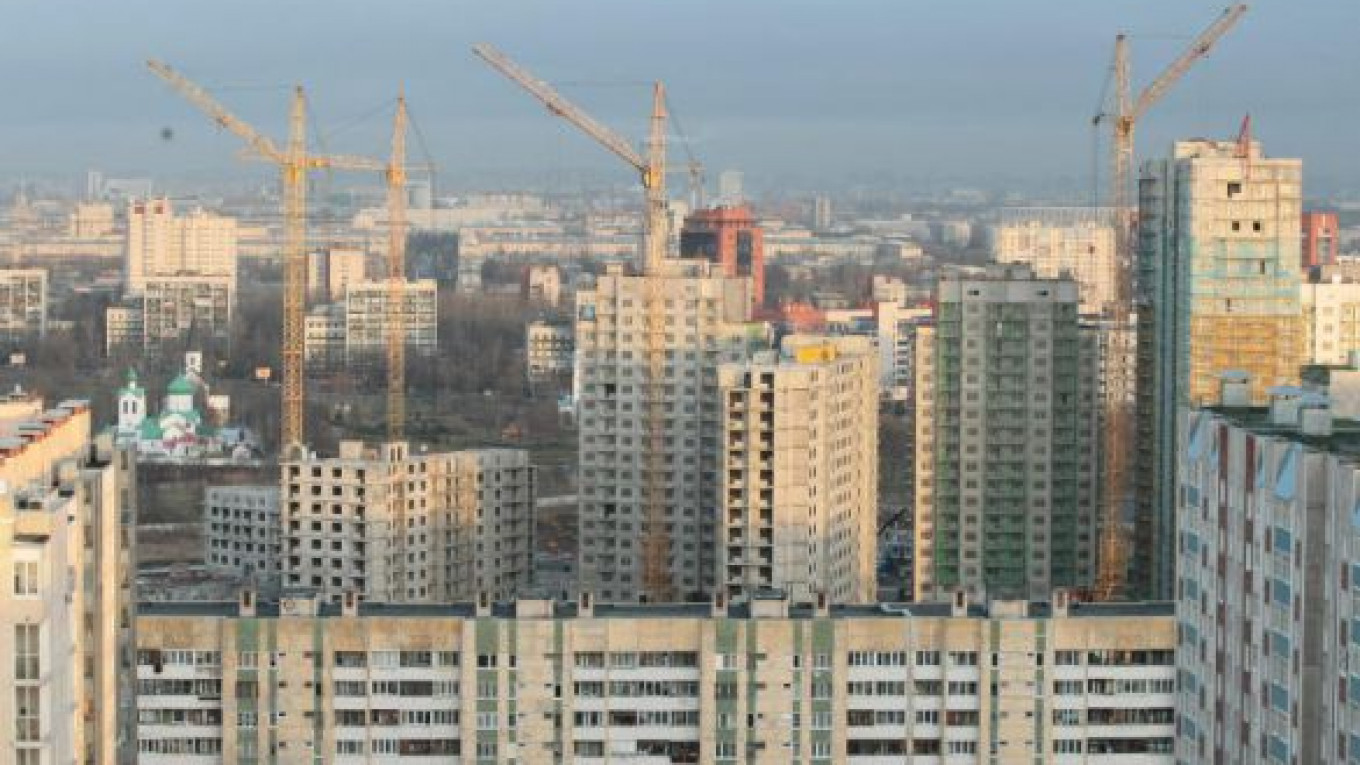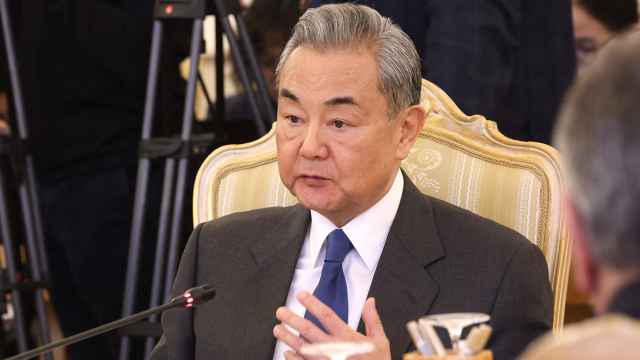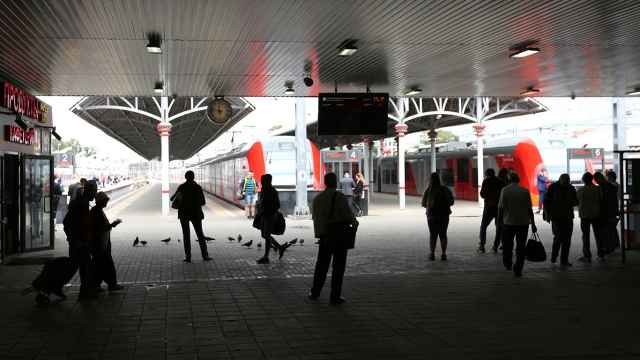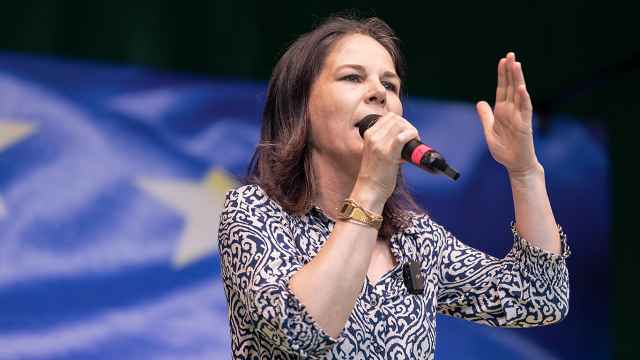After an explosion of investment in Russian real estate over the past decade, European and global funds, leery of sober economic forecasts and the unfolding political crisis in Crimea, are warily re-evaluating their options.
"We are watching things very closely," said David Simons, managing director of warehouse developer Radius Group. "Our business plan for 2014 calls for further investment, but obviously we will monitor that very carefully to see how the situation develops."
Having taken a hit during the financial shock of 2008 to 2009, foreign real estate investors were just beginning to recover their nerve. But the political situation in Crimea, with the accompanying threat of economic sanctions from the West, could shake the confidence of investors who were on the verge of committing their money, Simons said.
"It takes a long time to build up credibility and a very short time to destroy it. Through the end of last year and early this year you saw an increased confidence, but now people will take a step back and think: well, I do not need that headache right now," Simons said.
Foreign investment took off in the 2000s, accounting for 62 percent of all investment in Russian real estate between 2004 and 2008, according to a market analysis by Jones Lang LaSalle released last week.
Investors from the Nordic states and Western and Eastern Europe led the charge, with net purchases of more than $3.6 billion over the past decade, followed by international funds with net purchases of more than $2.3 billion.
During the same period, investors from Russia and the CIS, who had previously dominated the market, saw net sales of almost $3.6 billion and $3.4 billion respectively.
After the initial boom, the economic crisis of 2008 and 2009 shook many foreign companies, who stalled plans for investment in Russia and reoriented towards domestic markets.
But the market wobbled only briefly in its rise — Russian players took up the slack, increasing their share to almost 70 percent of investments between 2009 and 2013, the report found.
"Russians were often quicker in their decision-making and more interested in secondary properties, resulting in a larger total volume of transactions," said Olesya Dzuba, deputy head of the research department at Jones Lang LaSalle.
Finnish property investment company Sponda is a typical case. The company began investing in Russia in 2006 and gradually developed a diverse portfolio of retail, office and logistics properties, all located in Moscow and St. Petersburg.
Sponda continued to seek investment opportunities through 2008 and 2009, but noticed the change in other investors' priorities, said Sirpa Sara-aho, Sponda's senior vice president responsible for Russian operations.
"We did not change our strategy, but the market itself changed. The focus at that time was to secure cash flow and occupancy [as opposed to acquiring new properties]," Sara-aho said.
Total foreign investment volume has climbed again in the years following the crisis, from an average of $0.9 billion in 2009 and 2010 to an average of $2.9 billion between 2011 and 2013, the report from Jones Lang LaSalle found.
Whether economic stagnation and the crisis over Russia's possible annexation of Crimea will be enough to derail investment growth is an open question.
Last year, the Russian economy slowed sharply, growing only 1.3 percent. The latest Economic Development Ministry forecast predicted growth of about 2 percent in 2014. In light of the situation in Crimea, many analysts have begun publishing even lower figures. In a report Monday, VTB Capital predicted zero-percent economic growth this year, Interfax reported.
Real estate, however, has seen a steady flow in investment in recent years even as other sectors suffered. Jones Lang LaSalle predicted in January that total investment in the real estate market could reach $7 billion in 2014.
Some long-term players are increasing their foothold in Russia. PPF Group, an active player on the Russian real estate market since the early 2000s, plans to double its investment in the country to 1 billion euros over the coming years, a company spokesman said Monday.
The market still has all the hallmarks — good returns, ample development opportunity — which have set it apart over the past decade, Radius's Simons said.
"The perceived Russian risk, and I would emphasize that word 'perceived,' will always offer investors better returns than they can get in more traditional institutional markets, such as Britain, the U.S., Europe, or Asia for that matter," Simons said.
The ultimate impact of the crisis in Crimea will depend on how far the U.S. and Europe are prepared to go. While visa bans on select individuals are unlikely to make much of an impact economically, further sanctions, such as a ban on investment in Russia, "would have a serious effect," he added.
Contact the author at d.damora@imedia.ru
A Message from The Moscow Times:
Dear readers,
We are facing unprecedented challenges. Russia's Prosecutor General's Office has designated The Moscow Times as an "undesirable" organization, criminalizing our work and putting our staff at risk of prosecution. This follows our earlier unjust labeling as a "foreign agent."
These actions are direct attempts to silence independent journalism in Russia. The authorities claim our work "discredits the decisions of the Russian leadership." We see things differently: we strive to provide accurate, unbiased reporting on Russia.
We, the journalists of The Moscow Times, refuse to be silenced. But to continue our work, we need your help.
Your support, no matter how small, makes a world of difference. If you can, please support us monthly starting from just $2. It's quick to set up, and every contribution makes a significant impact.
By supporting The Moscow Times, you're defending open, independent journalism in the face of repression. Thank you for standing with us.
Remind me later.






